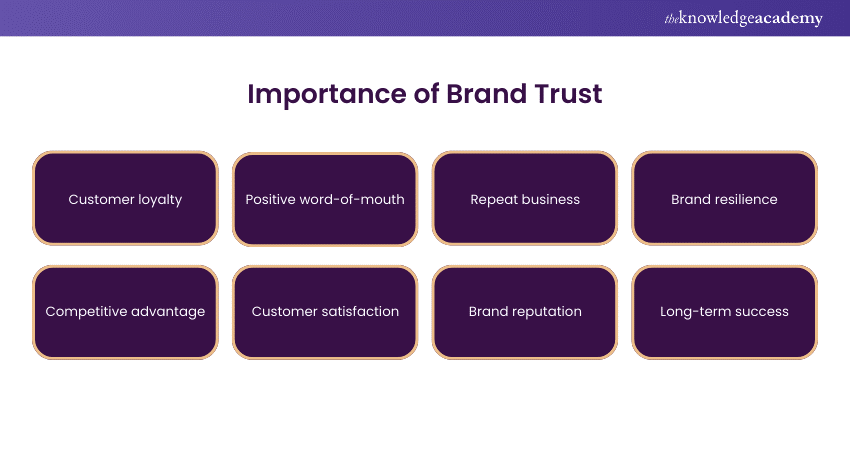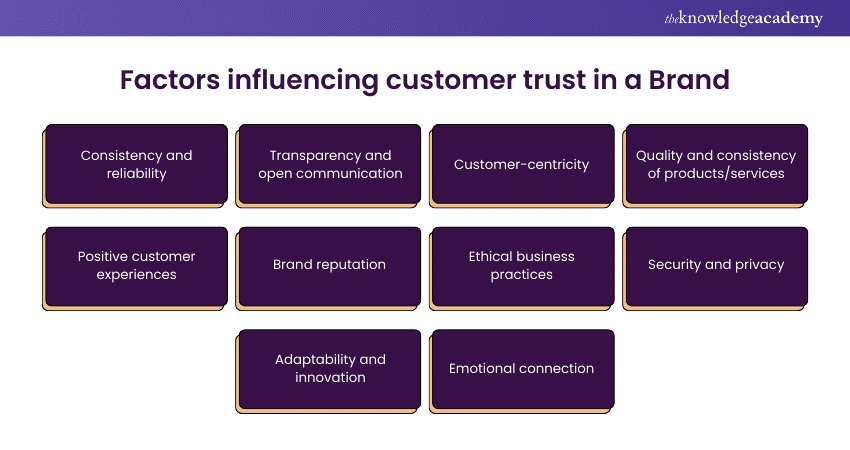We may not have the course you’re looking for. If you enquire or give us a call on 800969236 and speak to our training experts, we may still be able to help with your training requirements.
We ensure quality, budget-alignment, and timely delivery by our expert instructors.

Are you a business owner who wants to build a loyal and satisfied customer base? Or maybe you want to differentiate your brand from your competitors and increase your sales. Perhaps you are curious about how to create a positive and ever-lasting impression on your target audience. Then you must know What is Brand Trust.
The benefits of Brand Trust extend much beyond all the previously mentioned outcomes. Want to know more about these benefits? Keep Reading. This blog will provide an overview of What is Brand Trust, and also explore why it matters, how to measure it, and how to improve it, along with some helpful tips.
Table of Contents
1) What is Brand Trust?
2) Importance of Brand Trust
3) How do you build Brand Trust?
4) Factors influencing customer Trust in a Brand
5) Conclusion
What is Brand Trust?
Brand Trust is the confidence and reliance that consumers place in a brand, believing it will consistently deliver on promises, maintain quality, and act with integrity. It goes beyond product features, encompassing the brand's reputation, transparency, and ethical practices. Trust is built through positive experiences, effective communication, and aligning with customer values. Transparent business practices, ethical behaviour, and reliable customer service contribute to Brand Trust.
Trustworthy brands evoke loyalty, positive word-of-mouth, and resilience in times of challenges. In an era of information abundance, where consumers scrutinise brands' actions and values, building and maintaining Brand Trust is vital for long-term success and sustained customer relationships. It involves a commitment to authenticity, reliability, and ethical conduct, fostering a connection that goes beyond transactions and transforms customers into loyal advocates.
Importance of Brand Trust
Here are some key reasons why Brand Trust is important for businesses:

a) Customer loyalty: Brand Trust fosters loyalty as customers are more attracted towards a brand, believe it is reliable, consistent, and delivers on promises.
b) Positive word-of-mouth: Trustworthy brands benefit from positive word-of-mouth marketing, as satisfied customers share their experiences, influencing others to choose the brand.
c) Repeat business: Brands that instill trust will likely see higher repeat business rates, as customers feel confident in making repeated purchases.
d) Brand resilience: Trust acts as a buffer during challenges or crises, helping a brand weather adverse events with greater resilience, as customers are more forgiving.
e) Competitive advantage: Trust can be a significant differentiator in competitive markets, giving a brand a distinct advantage over competitors lacking a solid trust foundation.
f) Customer satisfaction: Trust contributes to overall customer satisfaction, as customers feel secure and satisfied when they believe in the brand's reliability and integrity.
g) Brand reputation: Trust is a cornerstone of a positive brand reputation, influencing how the brand is perceived by customers, stakeholders, and the public.
h) Long-term success: Building and maintaining Brand Trust is crucial for long-term success, as it forms the basis for enduring customer relationships, brand advocacy, and sustained business growth.
Enhance your understanding of improving your skills in Email Copywriting with our Web and Email Copywriting Masterclass!
How do you build Brand Trust?
Building Trust is a strategic business decision and a moral commitment to customers. Trust is fragile, and it can be challenging to regain once broken. Here are some pivotal methods Brands can employ to build Brand Trust amongst the masses:
1) Establish clear expectations
Building Brand Trust begins with setting clear expectations. Transparency is key in communication; brands should be explicit about their values, products, and services. This involves providing accurate information about what customers can expect from the brand. From product descriptions to company policies, clarity ensures that customers have a realistic understanding of what the brand offers.
For instance, an e-commerce platform should communicate delivery times, return policies, and product features. Misleading or ambiguous information can erode trust quickly. Honest and straightforward communication helps establish a foundation of trust between the brand and its audience.
2) Fulfill commitments
Trust is built on reliability, and fulfilling commitments is paramount. Consistency is crucial, whether it's delivering products on time, providing exceptional customer service, or adhering to quality standards. Brands must strive to meet or exceed the expectations they've set.
Meeting commitments requires a robust infrastructure, from supply chain management to customer support. If a brand continuously delivers on its promises, customers will trust it over time. Inconsistencies, on the other hand, can lead to scepticism and erode trust rapidly.
Enhance your understanding of Business Marketing with our Business Marketing Strategies Training – sign up now!
3) Amplify positive impressions
Positive impressions are potent trust-builders. Brands should actively seek ways to create positive experiences for their customers. This could involve going the extra mile in customer service, crafting high-quality products, or engaging in philanthropic activities that resonate with the brand's values.
Showing off good customer reviews and testimonials can make a strong impression. Social proof is an crucial way to build trust by showing examples of happy customers. Talking to customers on social media, replying to their comments, and openly dealing with any issues shows that you really care about making customers happy.
4) Continuously reinforce trust-building efforts
Building trust is a continuous process that needs constant work. It's not a one-time task but a commitment to fostering a positive and reliable brand image. Regularly evaluate customer feedback, adapt to changing consumer needs, and evolve with market trends.
Consistent communication is vital. Brands should keep customers informed about company updates, improvements, and changes. This transparency fosters a sense of connection and inclusivity. It's equally important to acknowledge and rectify mistakes promptly. Admitting errors and taking corrective actions can enhance trust by demonstrating accountability.
Become a professional in Copywriting with our Copywriting Course – register now!
Factors influencing customer Trust in a Brand
Customer trust in a brand is influenced by factors that collectively shape perceptions and expectations. Building and maintaining trust is essential for establishing strong, long-lasting customer relationships. Here are key factors that play a crucial role in influencing customer trust:

a) Consistency and reliability: Consistency in delivering products or services as promised is foundational to trust. Brands that always meet or exceed customer expectations build a reputation for reliability. This extends across various touchpoints, from product quality to customer service interactions.
b) Transparency and open communication: Transparent communication fosters trust by providing customers with clear, honest information. Brands openly communicating their values, processes, and potential challenges build credibility. Openness about pricing, policies, and any changes within the company demonstrates a commitment to building a transparent relationship.
c) Customer-centricity: Prioritising the needs and preferences of customers builds trust. Brands that actively listen to customer feedback, address concerns promptly, and adapt based on customer insights demonstrate a customer-centric approach. This involves meeting expectations and actively seeking ways to enhance the customer experience.
d) Quality and consistency of products/services: Quality and consistency directly impact trust. A brand known for delivering high-quality products instils confidence in customers. Consistency in maintaining these standards over time reinforces trust and reliability.
e) Positive customer experiences: Positive interactions and experiences contribute significantly to trust-building. This includes excellent customer service, smooth transactions, and positive post-purchase experiences. Brands that prioritise customer satisfaction create a positive association that enhances trust.
f) Brand reputation: A positive brand reputation, often built through Word of Mouth Marketing, reviews, and testimonials, influences trust. A brand with a strong reputation for integrity, reliability, and positive experiences will likely be trusted by potential customers.
g) Ethical business practices: Brands that engage in ethical business practices and demonstrate social responsibility are perceived as trustworthy. This involves considerations such as fair labour practices, environmental responsibility, and contributions to social causes.
h) Security and privacy: In times of increasing data security and privacy concerns, brands prioritising customer information inspire trust. Clear privacy policies, secure transactions, and transparent data practices give customers a sense of security.
i) Adaptability and innovation: Brands that demonstrate adaptability to changing market conditions and a commitment to innovation are often considered forward-thinking and reliable. This adaptability instils confidence in customers that the brand will continue to meet their evolving needs.
j) Emotional connection: Establishing an emotional connection with customers goes beyond transactional relationships. Brands that resonate with customers on a personal or emotional level, aligning with their values and aspirations, create a deeper and more meaningful trust.
Become a professional in Copywriting with our Copywriting Course – register now!
Conclusion
We hope through this blog we were able to answer your queries about What is Brand Trust and its various aspects. Building Brand Trust begins by setting clear expectations. Transparency is key in communication, and brands should be explicit about their values, products, and services. This involves providing accurate information about what customers can expect from the brand.
Become an expert in retaining customers with our Customer Retention Training today!
Frequently Asked Questions
How can businesses actively build and maintain Brand Trust?

Businesses can build and maintain Brand Trust by prioritising transparency in communication, consistently delivering on promises, ensuring product/service quality, actively engaging with customer feedback, demonstrating ethical practices, and adapting to customer needs. Building positive experiences and openly addressing issues contribute to a trustworthy brand image
In what ways does Brand Trust contribute to a company's resilience during challenges or crises?

Brand Trust acts as a protective shield during challenges or crises by fostering customer loyalty. A trusted brand is more likely to retain customers' confidence, receive understanding during setbacks, and recover more effectively. This loyalty minimises negative impacts, helping the company weather challenges and emerge stronger from adversity.
How do you calculate Brand Trust?

Brand Trust is challenging to quantify with a single metric. It involves analysing customer surveys, feedback, and reviews, measuring customer satisfaction, and monitoring brand reputation. Key indicators include consistency, transparency, and positive experiences. While there isn't a standardised formula, these factors collectively offer insights into the level of Brand Trust.
What are the other resources and offers provided by The Knowledge Academy?

The Knowledge Academy takes global learning to new heights, offering over 3,000 online courses across 490+ locations in 190+ countries. This expansive reach ensures accessibility and convenience for learners worldwide.
Alongside our diverse Online Course Catalogue, encompassing 19 major categories, we go the extra mile by providing a plethora of free educational Online Resources like News updates, Blogs, videos, webinars, and interview questions. Tailoring learning experiences further, professionals can maximise value with customisable Course Bundles of TKA.
What is Knowledge Pass, and how does it work?

The Knowledge Academy’s Knowledge Pass, a prepaid voucher, adds another layer of flexibility, allowing course bookings over a 12-month period. Join us on a journey where education knows no bounds.
What are related PRINCE2 courses and blogs provided by The Knowledge Academy

The Knowledge Academy offers various PRINCE2 courses, including PRINCE2 Foundation, Practitioner, and Agile. These courses cater to different skill levels, providing comprehensive insights into Project Management methodologies.
Our Project Management blogs covers a range of topics related to PRINCE2, offering valuable resources, best practices, and industry insights. Whether you are a beginner or looking to advance your Project Management skills, The Knowledge Academy's diverse courses and informative blogs have you covered.
Upcoming Digital Marketing Resources Batches & Dates
Date
 Digital Marketing Course
Digital Marketing Course
Fri 23rd May 2025
Fri 25th Jul 2025
Fri 26th Sep 2025
Fri 28th Nov 2025






 Top Rated Course
Top Rated Course



 If you wish to make any changes to your course, please
If you wish to make any changes to your course, please


